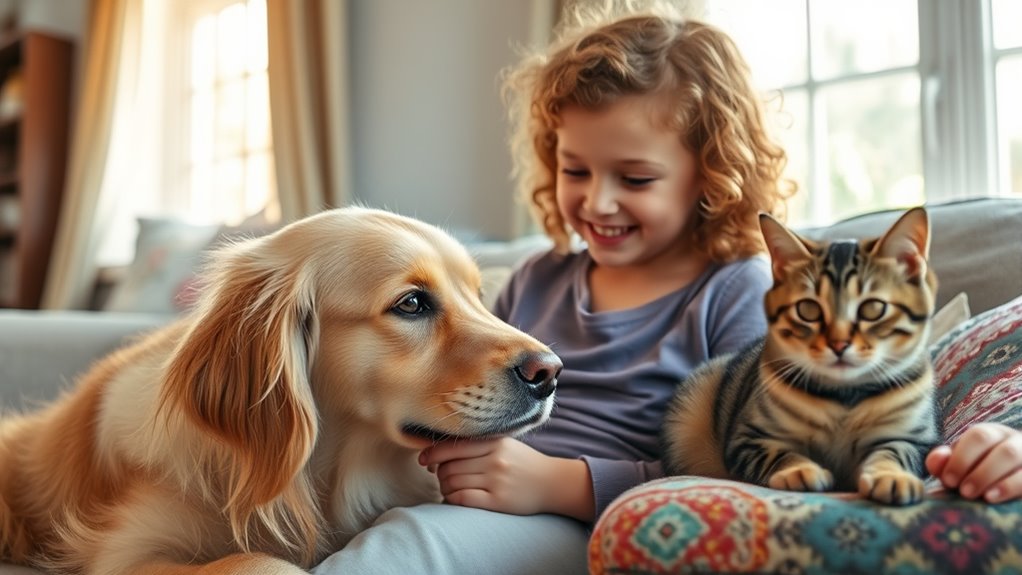Having pets can greatly boost your child’s social, emotional, and physical skills, teaching responsibility and empathy through caring for their furry friends. Pets help kids develop confidence, patience, and better social interactions, while also creating a warm family environment. Proper training and allergy management guarantee everyone’s safety and happiness. By incorporating pets into your home, you build strong bonds that benefit your entire family—discover how to make this positive connection even stronger.
Key Takeaways
- Pets enhance children’s social, emotional, and physical development by fostering empathy, responsibility, and confidence.
- Responsible pet training promotes respectful interactions, reducing misunderstandings and building a safer, more enjoyable family environment.
- Caring for pets teaches children patience, routine, and nurturing skills that positively influence family dynamics.
- Managing pet allergies through cleaning and breed selection ensures a healthy, allergy-aware household.
- Pets strengthen family bonds by serving as loyal companions, encouraging shared responsibilities, and providing emotional support.

Have you ever wondered how pets can influence a child’s development? Bringing a furry friend into your home isn’t just about adding cuteness; it’s about shaping your child’s social, emotional, and even physical growth. As you introduce a pet into your family, you’ll find that pet training becomes an important step. Teaching your child how to interact responsibly and kindly with the pet fosters empathy and respect. It also helps your child understand boundaries—like not pulling on the tail or disturbing the pet when it’s resting. Consistent pet training can make interactions safer and more enjoyable, reducing misunderstandings that might lead to bites or scratches. Plus, when your child learns to care for their pet—feeding, grooming, and playing—they develop a sense of responsibility that can carry over into other areas of life.
Introducing a pet teaches responsibility, empathy, and boundaries for your child’s growth and well-being.
At the same time, allergy management is a key consideration. Many families worry about allergic reactions, but with proper planning, you can create a safe environment. Regular cleaning, such as vacuuming and wiping surfaces, helps reduce pet dander, which is often responsible for allergies. Choosing hypoallergenic breeds or those known to shed less can also make a big difference. If your child shows signs of allergies, working with a healthcare provider to develop a management plan ensures they can enjoy the companionship of a pet without discomfort. Introducing pets gradually and monitoring their reactions allows you to adjust accordingly, making sure that both your child’s health and the pet’s well-being are prioritized.
Having a pet teaches children about routine and patience. As they learn to care for their animal, they understand the importance of consistency and commitment. This nurturing process can boost their confidence and boost their emotional intelligence, especially when they see their pet respond to their care and attention. Furthermore, pets provide comfort during stressful times, acting as loyal confidantes. They can help children develop better social skills because they often serve as a bridge in interactions—whether with family members or peers—who see how kindly your child treats their animal.
Ultimately, integrating a pet into your family isn’t just about the joy a furry friend brings; it’s about fostering growth and responsibility. By focusing on pet training, you teach your child respect and boundaries, and through allergy management, you ensure everyone remains healthy and happy. This balance creates a nurturing environment where both your child and pet can thrive, building bonds that last a lifetime.

Complete Guide to Choosing the Perfect Hypoallergenic Puppy for Your Family: Comprehensive Guide to the 20 most Popular Low-Shedding, Hypoallergenic Breeds of Dogs
As an affiliate, we earn on qualifying purchases.
As an affiliate, we earn on qualifying purchases.
Frequently Asked Questions
How Do Pets Influence Children’s Emotional Development?
Pets play a essential role in shaping your child’s emotional development. They help your child build emotional resilience by providing comfort during tough times and encouraging empathy through caregiving. Pets also boost social skills, as children learn to communicate, share, and be responsible. By fostering these qualities, pets help your child develop a balanced emotional outlook, preparing them for healthier relationships and better coping strategies in life.
What Safety Precautions Are Needed With Pets and Young Children?
You should prioritize safety when introducing pets to young children. Keep up with pet vaccination schedules to prevent illnesses, and guarantee regular pet grooming to reduce shedding and dirt. Always supervise interactions, teaching kids gentle handling. Create boundaries, like a safe space for your pet, and maintain hygiene by washing hands after play. These precautions help foster a safe, happy environment for both your child and pet.
Can Pets Help Children With Special Needs?
Pets can greatly support children with special needs by acting as therapy animals, offering comfort and companionship. They help improve social skills through interactions, encouraging communication and emotional expression. You’ll notice your child gaining confidence and feeling more secure as they bond with their furry friends. These animals provide consistent, non-judgmental support, making everyday activities easier and more enjoyable for children with unique needs.
How Do Pets Affect Family Routines and Responsibilities?
Pets influence your family routines and responsibilities by adding daily tasks like feeding, grooming, and pet training. You take charge of household chores such as cleaning up pet hair and maintaining their space. This involvement encourages shared responsibilities, teaches kids accountability, and strengthens bonds. You find that managing these routines becomes a meaningful part of your family life, fostering cooperation and creating a structured, caring environment for everyone.
What Are the Long-Term Benefits of Pets for Kids?
Imagine a future where your child grows up with qualities like compassion and responsibility. Long-term, pets teach valuable lessons—like understanding pet nutrition and selecting the right breed—that shape character. As they care for their furry friend, they develop empathy, patience, and life skills. These experiences create a foundation for emotional intelligence, resilience, and social skills, benefiting them well beyond childhood and enriching their personal and professional lives.

HoAoOo Pet Training Clicker with Wrist Strap – Dog Training Clickers (New Black + Blue)
Come in 2 pack button clickers with wrist strap in 2 different colors:Black, blue
As an affiliate, we earn on qualifying purchases.
As an affiliate, we earn on qualifying purchases.
Conclusion
So, next time your kid’s tantrum turns into chaos, just remember: your furry friend’s unconditional love and endless patience are *way* cheaper than therapy. Who needs a family therapist when you’ve got a tail-wagging, purring therapist on call 24/7? Embrace the chaos, cherish the cuddles, and let your pets remind you that sometimes, the best family therapy comes with fur and four paws. After all, who knew chaos could be so adorable?

TEUVO Pet Care Play Set Doctor Kit for Kids, 16 Pcs Doctor Pretend Play Vet Dog Grooming Toys Puppy Dog Carrier Feeding Dog Backpack Gifts for Girls Boys 3-7 Years Old
including a plush dog, pet case, plastic scissors, hair dryer, gel shower and so on. With this complete…
As an affiliate, we earn on qualifying purchases.
As an affiliate, we earn on qualifying purchases.

Native Pet Dog Allergy Chews – Dog Allergy Relief with Probiotics and Colostrum for Itchy Skin Relief to Support Seasonal Allergy and Healthy Immune System – All Natural Anti-Histamine – 30 Chews
MINIMALLY PROCESSED AIR DRIED CHEWS FOR MAXIMUM BENEFIT: Say goodbye to traditional allergy medicine for dogs! Our air-dried…
As an affiliate, we earn on qualifying purchases.
As an affiliate, we earn on qualifying purchases.









